Lazaro the Andean goat herder examined my rapidly swelling ankle, looked me straight in the eye and said, “Your leg is broken. If you don’t let me fix it, you will walk with a limp like me for the rest of your life.”
I didn’t think Lazaro knew what he was talking about, or that my leg was broken. After all he was functionally illiterate. I thought my ankle was just severely sprained, and if he pulled on it things could only get worse.
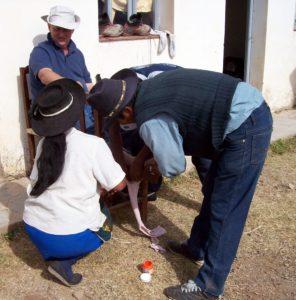
I asked him, “Have you ever fixed a man’s broken leg before?”
He said, “No, but I’ve fixed many goat legs. A bone is a bone.”
At that particular moment Lazaro’s declaration, “A bone is a bone,” did not inspire me with a great deal of confidence in his orthopedic expertise. I needed to make a difficult decision on the spot. I couldn’t run away from my dilemma. Heck, I couldn’t even walk.
We were high up in the Andes Mountains a full day’s hike on two good legs from the nearest road. About twenty people gathered around to see what I would do, or should I say, let Lazaro do.
What kind of mess had I gotten myself into this time?
In 1967, Aretha Franklin had a breakout hit record that almost every American alive back then remembers. “R-E-S-P-E-C-T, find out what it means to me… A little respect, just a little bit.”
Several years earlier, while on a trip to Zimbabwe, my friend Noah Manyika taught me that in his Shona culture a man who doesn’t know how to show respect, isn’t worthy of respect. I believe this principle is true in all cultures, or at least it should be. So at our Center for Equipping Missionaries in Argentina we taught every student to respect local people, and their local knowledge.
One of the greatest self-inflicted barriers we can place between others and ourselves is pride. It is deadly to any real relationship. If you convey, or even believe secretly in your heart that you know more, that your way is better, or that your culture is superior, you will never develop any trusting cross-cultural relationships.
We had arrived four days earlier in Iruya, an isolated Andean Mountain town in northwestern Argentina. Our mission team was a mix of North Americans and Argentines. The Argentines came from the flat land provinces of Chaco and Corrientes more than eight hundred miles away and from an entirely different culture. As we bounced along in our bus across the fourteen thousand feet above sea level pass, it looked as if the narrow dirt road in front of us dropped off the edge of a cliff.
Argentines and North Americans alike either hid their eyes in fear, or gawked in amazement at the frightening but stark beauty of the distant valley below. We descended through a series of tight switchbacks where the back wheels of the bus scrubbed the inside edge of the cliff, while the front bumper hung over several hundred feet of nothing except very thin air.
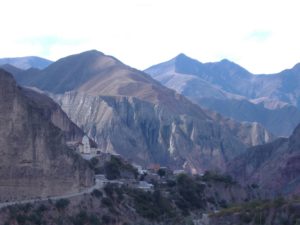
Loud emotional exclamations and shouts drowned out the sound of the bus’s motor and grinding gears.
“Oh my God, have mercy.”
“Look at that.”
“Help us Jesus!”
“We’re right on the edge. I can’t look.”
“Man, this is just like in a movie. I can’t believe this.”
“Oh God, this is so beautiful.”
“No one back home is ever going to believe this. Where is my camera?”
We finally rolled into town packed like sardines in the bus, because we stopped along the way to pick up numerous hitchhikers. For several weeks before our arrival a local pastor spread the word that free eyeglasses would be given to all who needed them at the community center the next day. Some walked for over twelve hours from distant villages because it was veritably impossible for them to obtain eyeglasses where they lived.
We set up the clinic and began to give out used prescription glasses we brought from the USA. One woman, who made her living as a seamstress, wept when she could thread a needle for herself for the first time in a long time.
An elderly gentleman walked two days to get there. He reached up and touched the face of our team member who adjusted his new glasses and said, “Oh, now I can see you!”
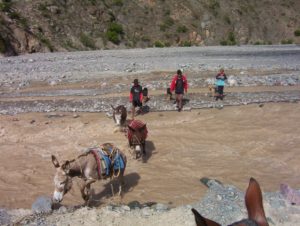
Once the clinic was operational, a dozen of us prepared to set out for the distant village of Abra de Araguyuk. We packed six donkeys with as much food, clothing, school supplies, and Gospel literature as they could carry. Lazaro was our guide.
He walked with a drastic limp, but we could not keep up with his pace on the trail. With each step on his good leg he sort of skipped and hopped forward as he swung the other one around. Many years before he fell and broke his left leg, but the bone had never been properly set.
My pace was slow and labored at over twelve thousand feet above sea level where less oxygen is available to out of shape lungs. After walking several hours up the steep narrow trail cut into the side of the mountain we arrived at Lazaro’s village of Rodeo.
Only about thirty people lived there, but they set about making us feel like respected and honored guests. They gave us their beds to rest in while they unloaded the donkeys, fed and watered the livestock, and prepared an evening meal. As the sun set over one of the most breath taking vistas I ever saw of distant mountain ridges and river carved valleys, they called us to supper.
They sacrificed two goats for us and roasted them in a round clay oven fueled by the thorn bushes that grow high above the tree line. They also served us yellow, blue, red, and purple Andean potatoes about the size of golf balls. Each color had its own distinct flavor.
The brave of heart elected to drink Chicha with our meal. It’s a slightly carbonated, slightly alcoholic drink made when the women of the village chew up corn, spit it into a jug, and then wait a couple of weeks for it to ferment.
I remembered that the Bible says to eat, or in this case drink, anything they set before you. Why not give it a try?
Bedtime came soon after dark. We needed an early start to make it all the way up to Abra de Araguyuk and back down to Rodeo in one day at our slow pace. Lazaro insisted that our team use the best of the available sleeping accommodations. The locals doubled up, or slept on dirt floors so that their visitors could be comfortable.
The following morning we ate a quick breakfast of sweet instant coffee, bread, and preserves made from the local cayote cactus. Then we started the ascent to our final destination. It took about two and a half hours for our team to scramble up the path. The elementary school children from Rodeo can run up the same trail in about forty-five minutes on their way to school in Abra.
A government health care nurse, who comes to the little first aid station once a week, had invited us to this village. He coordinated it so that he would be there when we came. The donkeys loaded with goods and a gaggle of strange outsiders were all that was necessary to gather a large crowd.
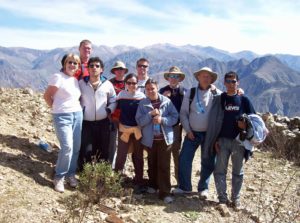
The team did a wonderful job giving out warm clothes, school supplies, and food to the women and children. No men showed up for some reason. So many people pressed into the small aid station building that I decided to take a walk in order to make more room inside.
I found Lazaro standing at the edge of a cliff staring off into the distance. I walked up and we stood side by side for a few minutes. He said nothing, so I remained quiet.
Down the side of the mountain, across the river valley, and up near the tops of the mountains that stretched toward the horizon I counted twelve distant villages.
After several minutes I asked my friend, “How long would it take to get to that village way over there on the other mountain?”
Lazaro turned and looked at me with a sly smile and said, “I could get there in two days, it would probably take you three or four.”
We both knew he was sort of joking. We laughed together, and then just continued to enjoy God’s awesome creation in silence for a while. After a few hours we needed to head back down to our base camp. Going down a mountain is easier on the legs and lungs, but it can be more dangerous than going up.
About half a mile before we arrived in Rodeo I felt spry, and was making pretty good time. I stepped on a rock that appeared solid, but it gave way. My ankle rolled and I sat down hard on top of the inside of my right foot. Pain shot all the way up my leg, but I didn’t think anything was broken. I just hoped it wouldn’t keep me from being able to make it down to Iruya in the morning.
Frank Albert, one of our team members from the USA, came back to help me. I couldn’t put any weight on the leg so he let me use his hiking poles to hobble back to the village. That last half-mile was painfully slow.
Lazaro took one look at my leg and said, “Your outside ankle bone is higher than your inside ankle bone. It’s supposed to be the other way around. Your leg is broken. If you don’t let me fix it, you will walk with a limp like me for the rest of your life.”
Well, that is how I wound up sitting in a chair high up in the Andes Mountains with a hurt leg and twenty people gathered around watching.
The young missionary candidates, who we had taught to respect local people and local knowledge, were now waiting to see if I would practice what I preached. I didn’t want to do something just for show, but I didn’t want to let Lazaro do further damage to my leg either.
Finally I said, “Lazaro, do whatever you think is best. I trust you.”
Two men took hold of my leg above the knee, and braced their hips against me so I would not be pulled out of the chair. Lazaro grabbed my foot and ankle. Then he started pulling. There was no John Wayne imitation for me, biting a piece of leather to endure the pain in silence. I screamed like a schoolgirl. Somehow Lazaro heard the bone snap into place in spite of the racket I made.
A young woman from Rodeo offered one of her stretchy fabric tube shirts to be cut into elastic bandages. Lazaro and his wife wound the strips tightly around my ankle and lower leg. When they finished it looked pretty professional.
The next morning everyone, including me, was convinced I could not walk back to town. The locals suggested that I ride the biggest mule in the village. It wasn’t that big of a mule. I weighed seventy-five more pounds than its maximum load capacity, but the owner was willing to put her valuable animal at risk for me.
They told me that none of the locals would ride all the way down the trail. Certain sections were considered too dangerous and steep, but I had no choice.
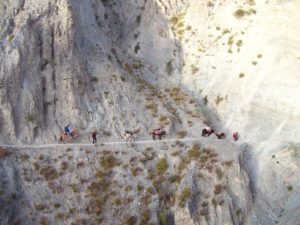
It proved to be a thrilling ride. On some of the steeper sections the belly of the mule was wider than the trail with a several hundred-foot drop directly under my broken leg. I can still see the perspective of that picture framed in my mind’s eye.
Once, we came to a washed out section of the trail about four feet across. With absolutely no encouragement from me the mule started running to get up speed so it could jump to the other side.
All I want to say about that, is this. If you do not believe in prayer, I would like for you to take that leap on the back of a runaway mule, especially if you have poor riding skills like me. It would make a good field test of how sincere your personal convictions really are against pleading for divine intervention.
I must confess that moment inspired of one of my all time, most sincere, and heartfelt prayers. Sometimes you only have time to say, “Oh, God!”
It took about two weeks for me to return to the USA and get an appointment with a licensed orthopedic doctor. After taking X-rays he showed me where my fibula had been completely broken about two inches above the ankle, but was now perfectly realigned and mending nicely.
The doctor said it was a good thing that Lazaro pulled my leg and reset the bone. If I had waited two weeks to see a real doctor, he probably would have had to schedule a surgery, re-break the bone, and put in metal pins.
As Aretha Franklin said, “R-E-S-P-E-C-T, find out what it means to me… A little respect, just a little bit.”
Just a little bit of respect for Lazaro saved me from walking around with a limp, or at least having pins in my leg for the rest of my life. Respect is a powerful thing. It is beneficial to both the giver, and the receiver. It costs you nothing except a little bit of pride and sometimes a little bit of courage.

Recent Comments